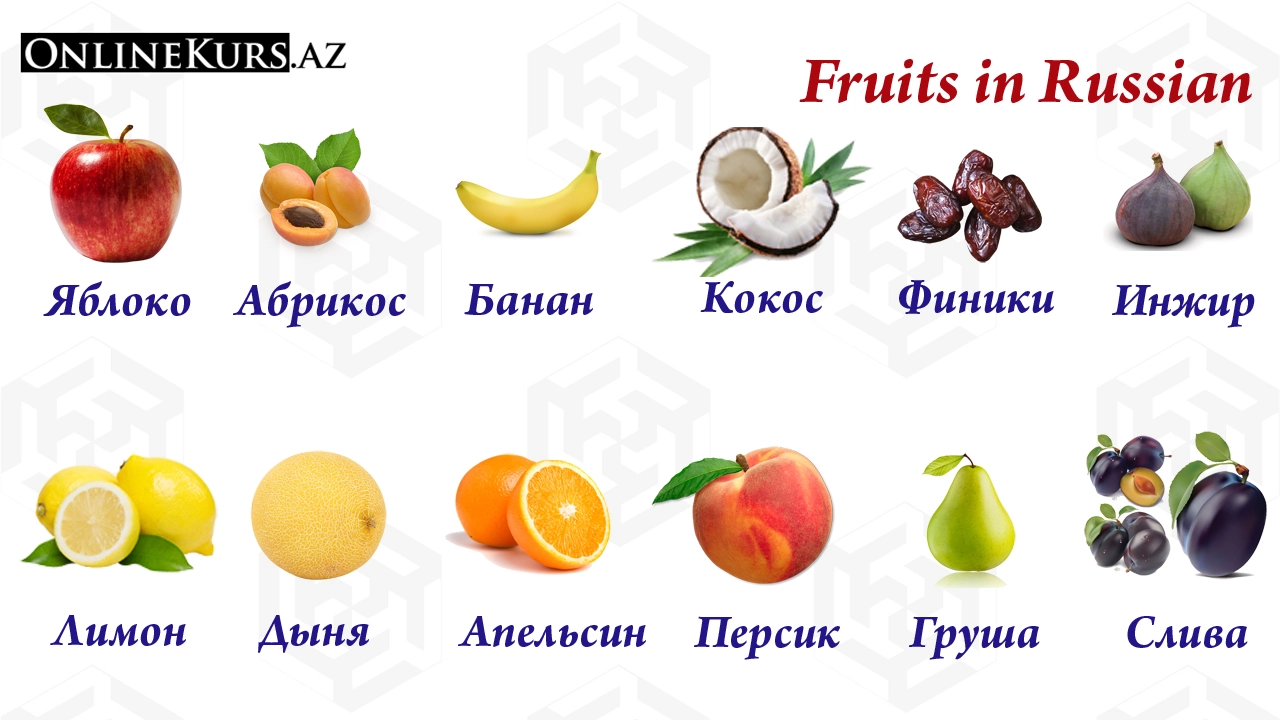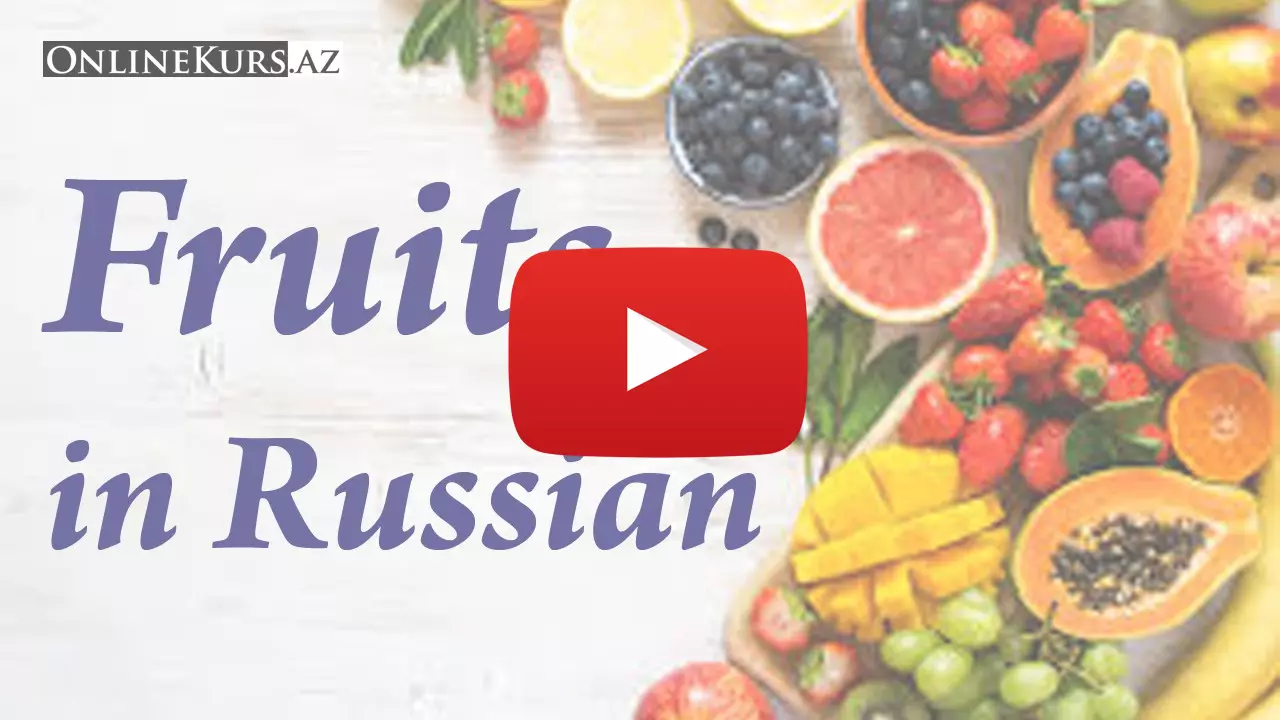Fruits in Russian
In this lesson we will learn new words on the topic: Fruits in Russian. At the same time, we will learn the names of dried fruits in Russian and the names of berries in Russian in this topic. So let's first learn the names of fruits in Russian.
The names of fruits in Russian
We all love delicious fruits, aromatic berries and healthy nuts. But what are they all called in Russian? Let's find out!
To learn the names of fruits in Russian and how to pronounce them, we have prepared a list of the most popular fruits in Russian. Since Russia is not a very hot country, it is very difficult to grow fruits that need a lot of sun and hot air. Apples and pears are the most popular fruits in Russia. Peaches, apricots, avocados, dates and even oranges are grown in southern Russia.
In general, if you want to learn Russian, it is important to start with simple words. From this point of view, our first lesson will be fruit names in Russian. If you know the names of fruits in Russian, you will be able to learn more about Russian cuisine, order desserts in Russian in restaurants and cafes, or shop in Russian at the fruit market where the fruits are sold. If you know the names of fruits in Russian, you will not have difficulty ordering a "компот", which is a traditional Russian drink made from berries and fruits. This lesson lists the most commonly used fruit names in Russian that you should know. After learning the lesson of fruits in Russian, be sure to look at our other lessons. For example, the lesson of Vegetables in Russian will teach you how to name vegetables in Russian. Learn Russian quickly and follow the exercises in our videos to easily memorize new words. Repetition is also an important condition, as they say - repetition is the mother of knowledge.
In Russia grows a large number of wild berries - mainly in the forests and tundra of Russia. However, almost all fruits in Russia were imported from Central Asia, China, Iran, the Caucasus and America. In ancient times, the Russians used berries instead of fruits.
Dry fruits in Russian
Of course, while learning the names of fruits in Russian, we should also know how dry fruits are called in Russian. Just like in English, in many cases the names of dried fruits in Russian is forms by adding the word dry - "сухой" to the name of the fruit in Russian, or dried - "сушеный". However, this rule does not apply to all fruits, for example, several names of dried apricots are found in Russian. Dried apricots are mainly called "Курага" in Russian. The root of the word "Курага" is taken from the Azerbaijani word "quru", which means dried apricot fruit without stem. Another example is the dried fruit of any kind of plum or plum, known in Russian as "Чернослив".
Berries in Russian
In Russian, the names of berries are called with words specific to the Russian language, unlike the names of dried fruits. Because the types of cultivated plants are foreign to the Russian territory due to the Russian nature, their fruits are brought only from the countries where these plants grow, so historically, Russians were ignorant about these fruits, so they passed from the local language to the Russian language. For this reason, words such as grapes, nuts, green plums, etc., were transferred to the Russian language. However, berry names in Russian are real Russian fruit names. So, most of the berries grew in the wild, in the forests and were also found on the territory of Russia. Therefore, the Russians were aware of these berries, and there are names of berries in Russian, specific to their language.

Proverbs related to fruits in Russian
"Яблоко от яблони недалеко падает." - The apple does not fall far from its tree. (This proverb is used when someone want to emphasize that children tend to do the same things as their parents, that they have similar character traits, behaviors and outlook on life. The expression is often used colloquially to indicate an unpleasant character or a negative upbringing.)
"Фрукты хороши в свое время." - Fruit is good in its time.
"От яблони – яблоко, а от ели – шишки." - From an apple tree - an apple, and from a pine - cones. (The meaning of this proverb is that everyone should do what he can do. If a shoemaker makes bread, it is unlikely that anything good will come of it.)
"Никакой лимон сладким не сделаешь." - You can't sweeten any lemon. (This proverb is used when it is no longer possible to fix something.)
Spelling and pronunciation of fruits in Russian.
|
|
[ фр`укты ] | Fruits |
|
|
[ гр`уша ] | Pear |
|
|
[ бан`ан ] | Banana |
|
|
[ й’аблака ] | Apple |
|
|
[ ап’ил’с’`ин ] | Orange |
|
|
[ ˈeɪ.prɪ.kɒt ] | Apricot |
|
|
[ в’`ишн’а ] | Cherry |
|
|
[ п’`эрс’ик ] | Peach |
|
|
[ сл’`ива ] | Plum |
|
|
[ арб`ус ] | Watermelon |
|
|
[ как`ос ] | Coconut |
|
|
[ инжыр ] | Fig |
|
|
[ хурма ] | Persimmon |
|
|
[ к’`ив’и ] | Kiwi |
|
|
[ д`ын’а ] | Melon |
|
|
[ анан`ас ] | Pineapple |
|
|
[ ф’ий’хаа ] | Feijoa |
|
|
[ алыч’а ] | Green plum |
|
|
[ гран`ат ] | Pomegranate |
|
|
[ `ай’ва ] | Quince |
|
|
[ ал’`ифка ] | Olive |
|
|
[ мушмула ] | Medlar |
|
|
[ сухафр`укты ] | Dry fruits |
|
|
[ м’ин’д`ал’ ] | Almond |
|
|
[ ф’`ин’ик’и ] | Dates |
|
|
[ из’`ум ] | Raisin |
|
|
[ фун’д`ук ] | Hazelnut |
|
|
[ гр’`эцк’ий’ ар’`эх ] | Walnut |
|
|
[ кашт`ан ] | Chestnut |
|
|
[ ар`ах’ис ] | Peanut |
|
|
[ ф’ист`ашка ] | Pistachio |
|
|
[ к’`эшй’у ] | Cashew nut |
|
|
[ й’агада ] | Berry |
|
|
[ мал’`ина ] | Raspberry |
|
|
[ клубн’`ика ] | Strawberry |
|
|
[ ч’ирн’`ика ] | Blueberry |
|
|
[ й’ижыв’`ика ] | Blackberry |
|
|
[ буз’ина ] | Elderberry |
|
|
[ кл’`уква ] | Cranberry |
|
|
[ шылкав’`ица ] | Mulberry |
|
|
[ барбар’`ис ] | Barberry |
|
|
[ бай’арышн’ик ] | Hawthorn |
|
|
[ шып`овн’ик ] | Rosehip |
|
|
[ к’из’`ил ] | Cornel |
|
|
[ в’инагр`ат ] | Grapes |
We believe that the education should be free and available to everybody. This is why some time ago, we made a decision to continue developing as a completely free network. But we need the support of our readers to continue creating new content, keep the development going and pay related expenses. If you like what we do and find it helpful, consider supporting us by making a donation to our accounts.
